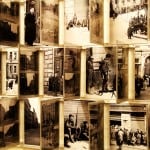Here’s the real reason why you should visit Austria’s second city.
Is Graz Worth Visiting?
Is Graz worth visiting? Well, the short answer is yes. Its Old Town is a UNESCO World Heritage Site, the whole place is a UNESCO City of Design and it’s also Austria’s Capital of Culinary Delights.
Later on in the article, you’ll find the traditional answer to the question, the one that walks you through the city’s architectural highlights and which helps you to build your own Graz itinerary.
But first, I want to ask the question a different way. For Graz is not just a pretty little city with postcard perfect views.
It’s a creative powerhouse, a place where ideas bubble up like bluebells in spring. It’s intoxicating and inspiring to surround yourself with people with ideas. It is, if you’ll indulge me, a little, a tonic for the soul.
So let me walk you through some of those ideas from the people I’ve met when I was there. Or, to phrase it another way, let’s meet the makers.
We’ll get to the pretty buildings at the end.
Disclosure: on this occasion, I visited Graz as a guest of Visit Graz as part of a project with Captivate Digital Media. As ever, as always, I kept the right to write what I like. Otherwise, there’s just no point.
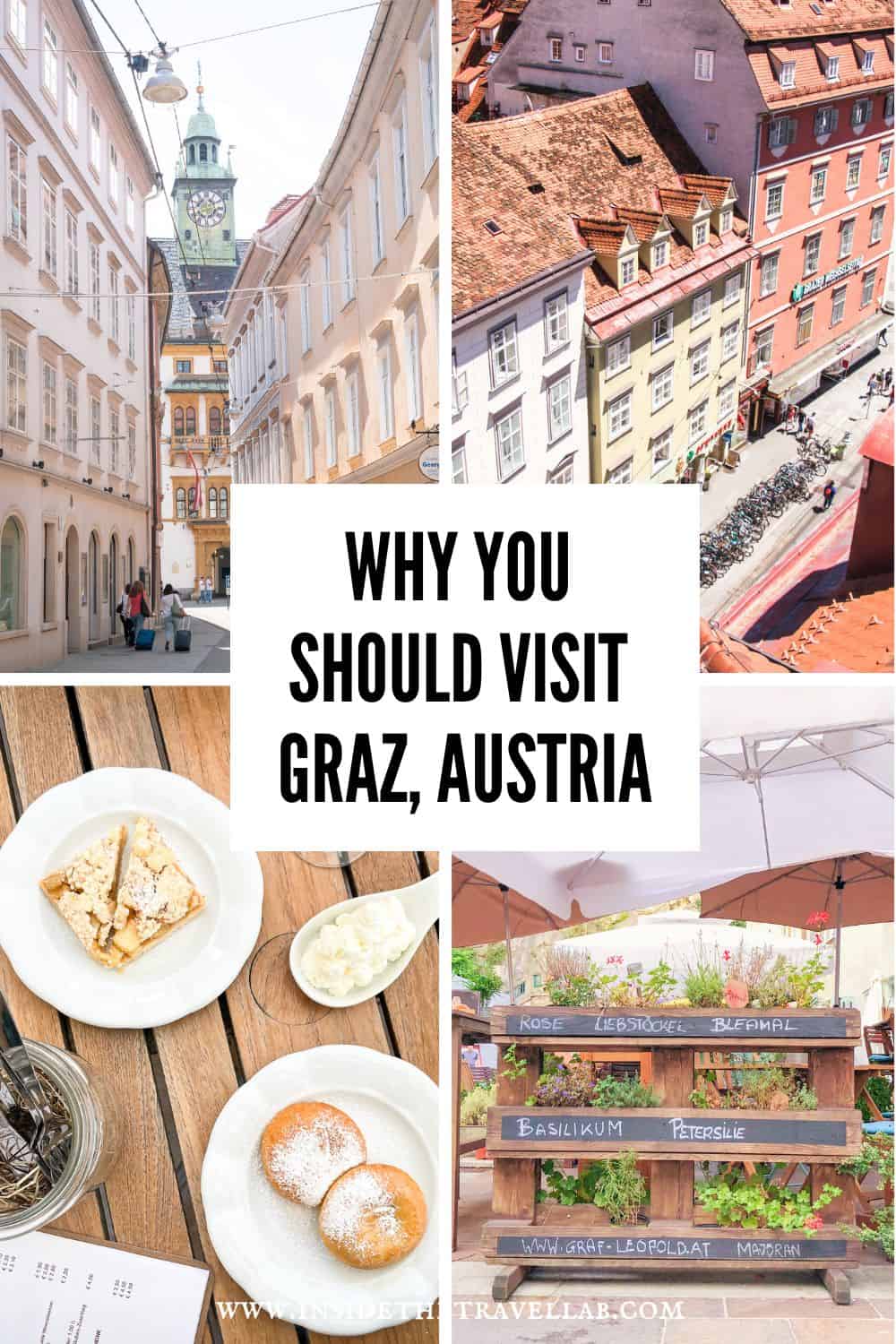
Meeting the Makers in Graz
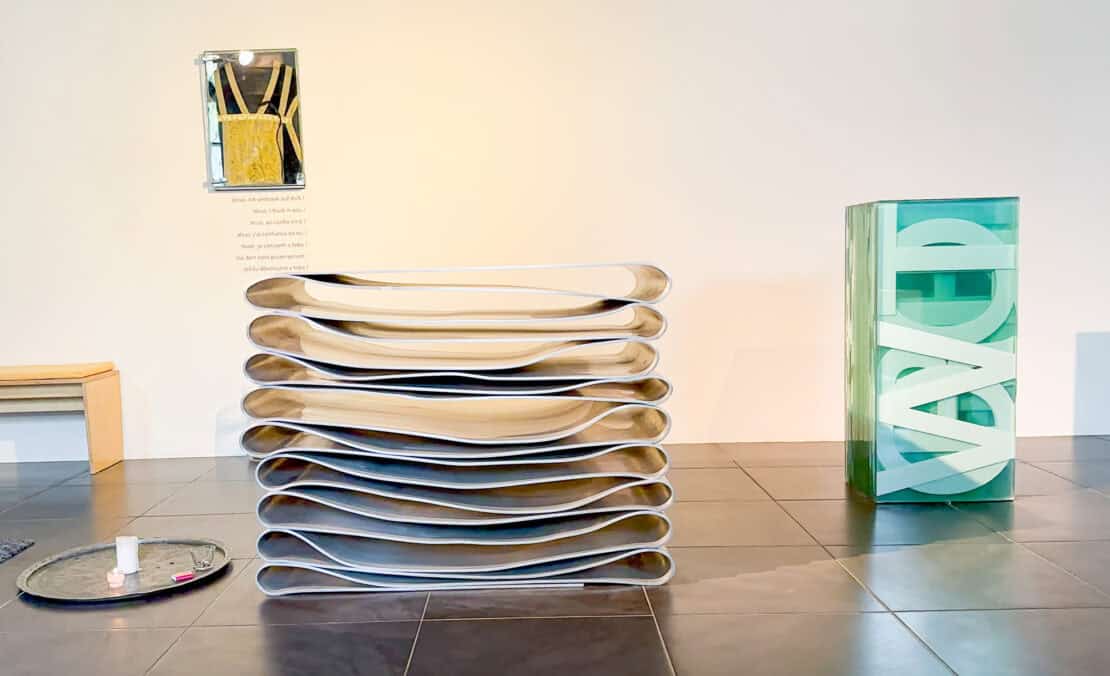
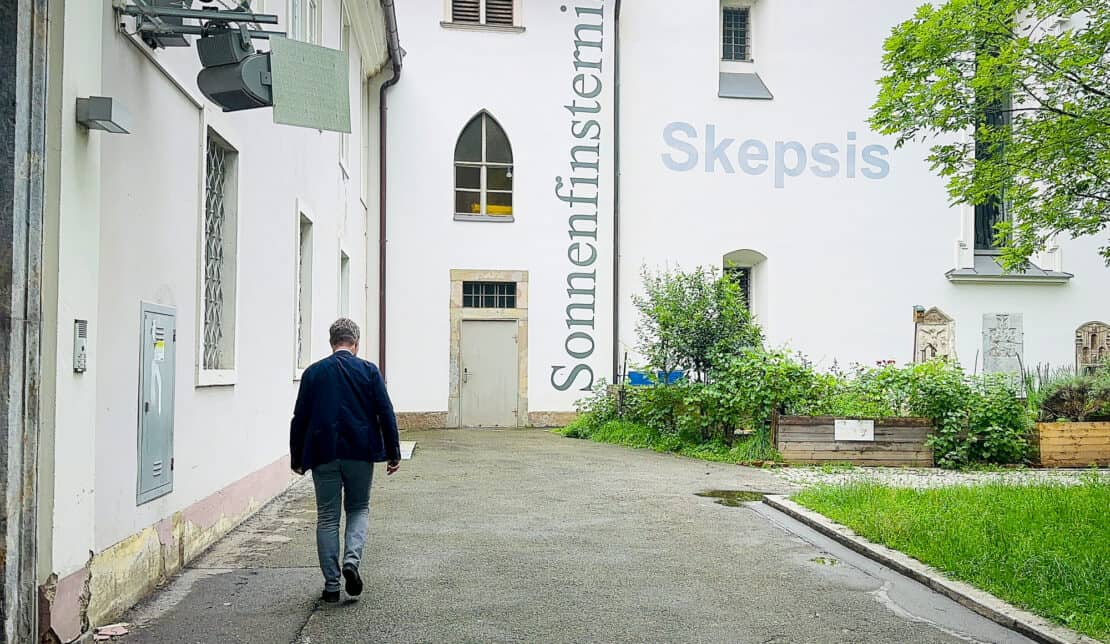
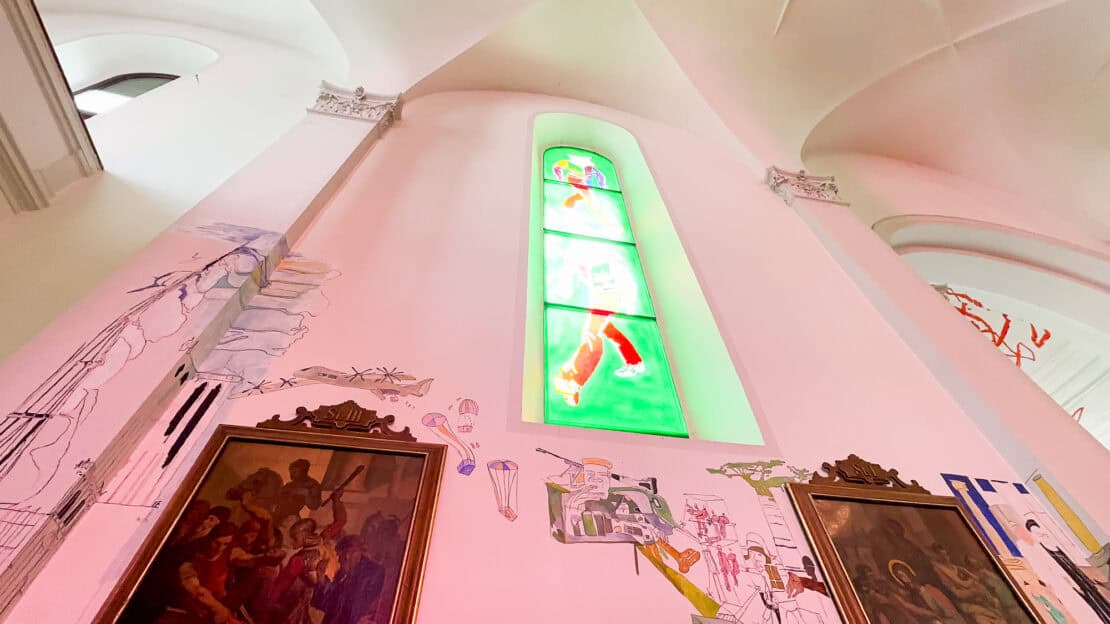
Come for the Art, Stay for the Conversation
Wherever you stand on the religious side of things, seeing the Virgin Mary soaked in blood red comes as a shock. The swell of the choral music lifted my heart and my eyeline to towards the heavens , or at least the taller columns, and that’s where I saw the barbed wire.
St Andrä ‘s church lives on the outskirts of the central part of Graz, in the slightly edgy zone of Gries. From the outside, the traditional mixes with the modern, with the scent of rosemary from the herb garden clashing with the big, bold letters screaming Skepsis on the spire.
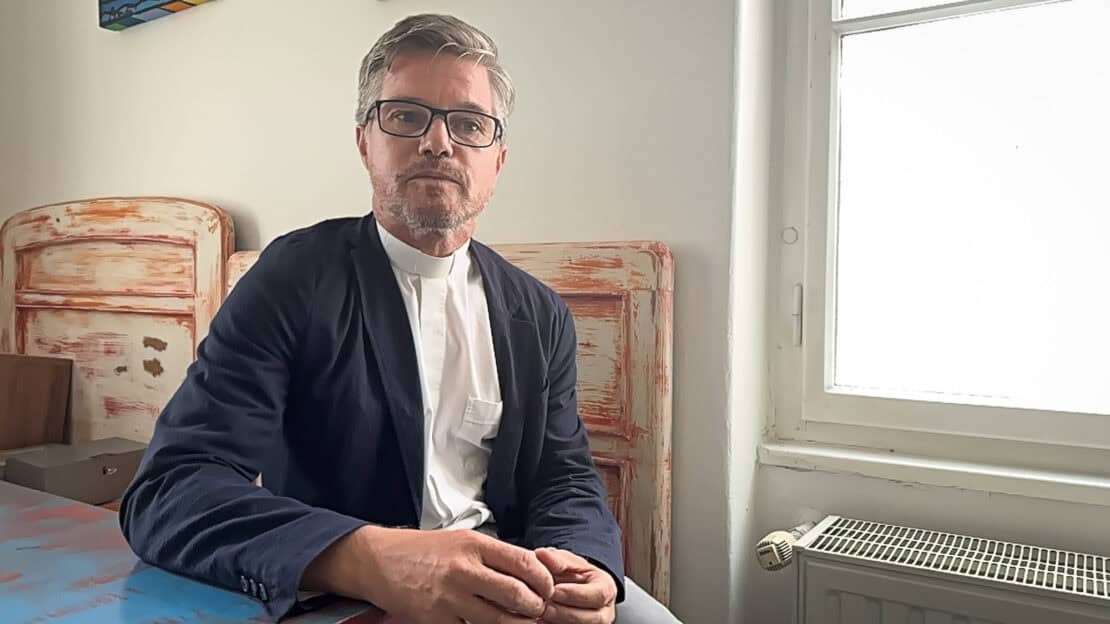
Alois Kölbl, Counsellor of St Andrä, is talking about the idea behind this progressive place, perched as it is in a multicultural neighbourhood with a raft of social problems.
The church seems to behave as most should but seldom do, as a welcoming place of respite for all people of all religions. A shelter from life’s hardships and a meeting point for support.
All are welcome here but how to spread the word? Through art, according to Kölbl. Some pieces are more obviously commissioned, such as the altarpiece fashioned from folded metal, but others look more like the screams of the ghetto.
It’s an attempt to get people to sit up and take notice, or as Kölbl puts it “come for the art, stay for the conversation.”
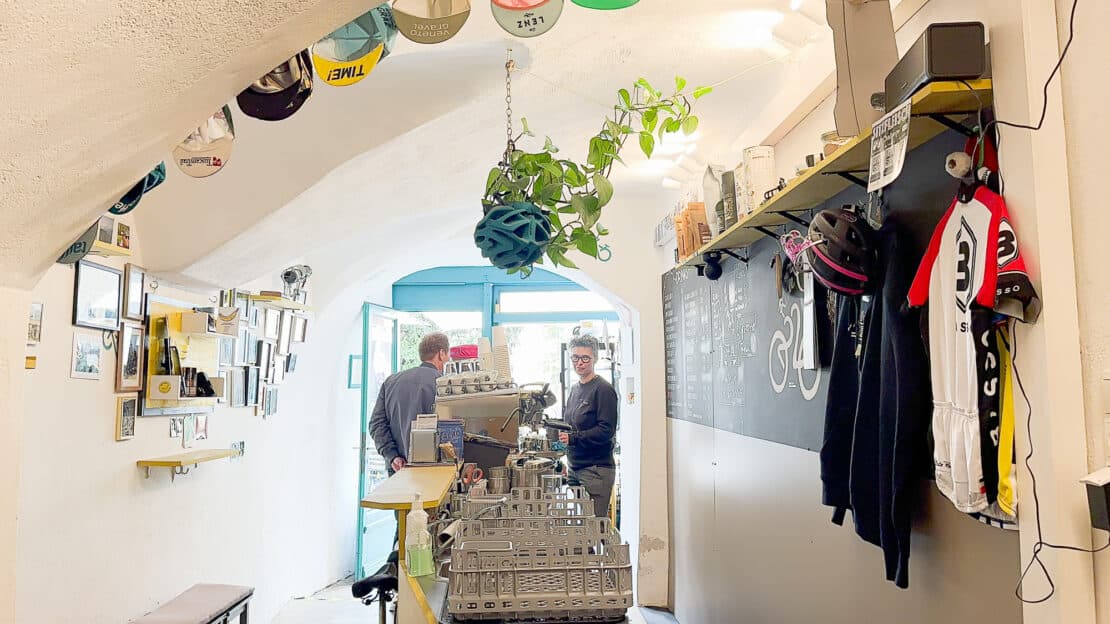
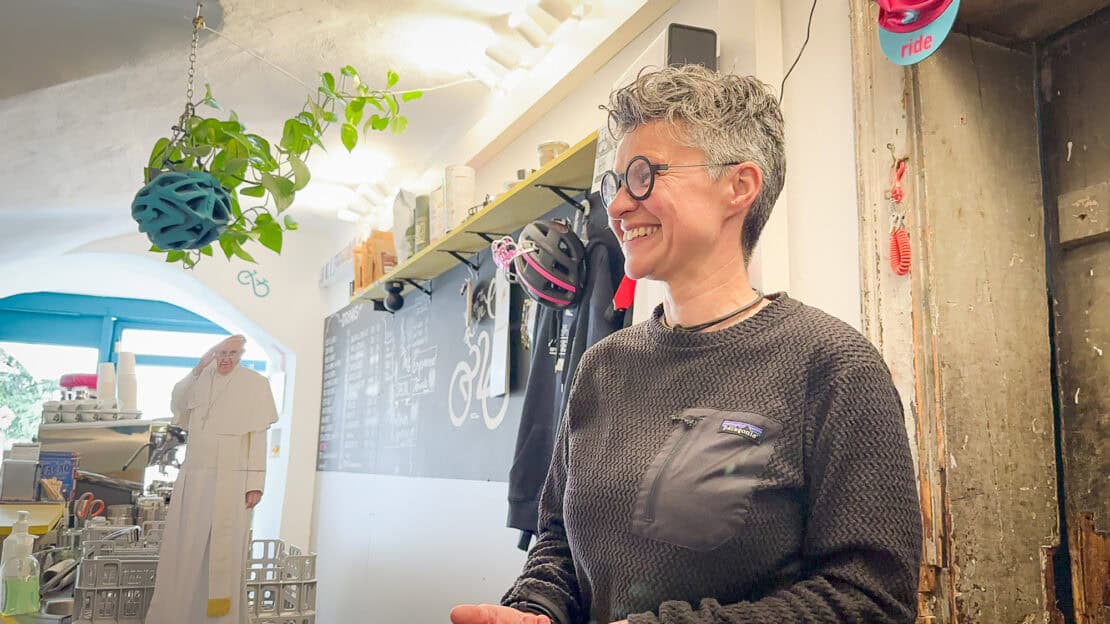
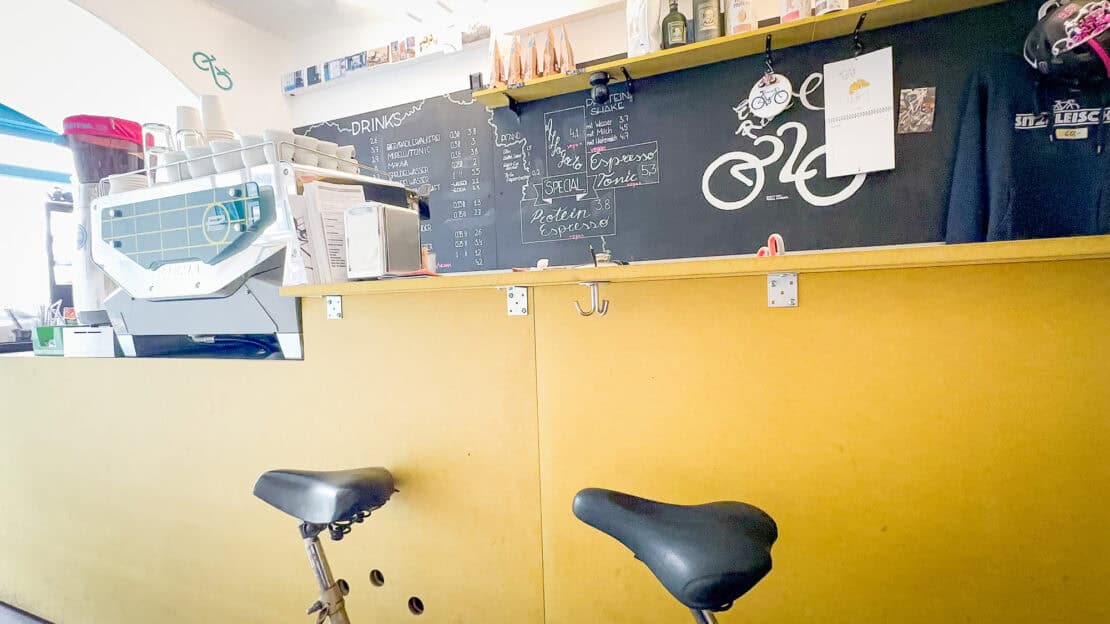
Wheely Great Coffee
Conversation, too, and meet ups is a theme across town and beneath the stone arches at another place with striking interior decor.
Coffee Ride, founded by Eva Berghofer, is a coffee shop with cycling helmets as plant pots and bicycle seats as, well, seats. The target audience is, not surprisingly, keen cyclists. Eva runs speed dating meetings for fellow lovers of lycra, although all are welcome the rest of the time.
She is passionate about her new project and has a unique way of looking at things. She’s dispensed with formalities, for example, calling everyone “Du” instead of the traditionally more polite “Sie” in German.
“Those are just words,” she explains. “They are not really about respect. I treat people with respect and they realise that.”
The shop opens at 9.22 each day (“Why must it always be on the hour?) and there’s a wheel of fortune when you settle the bill.
And, on top of everything else, she makes all the cakes herself.
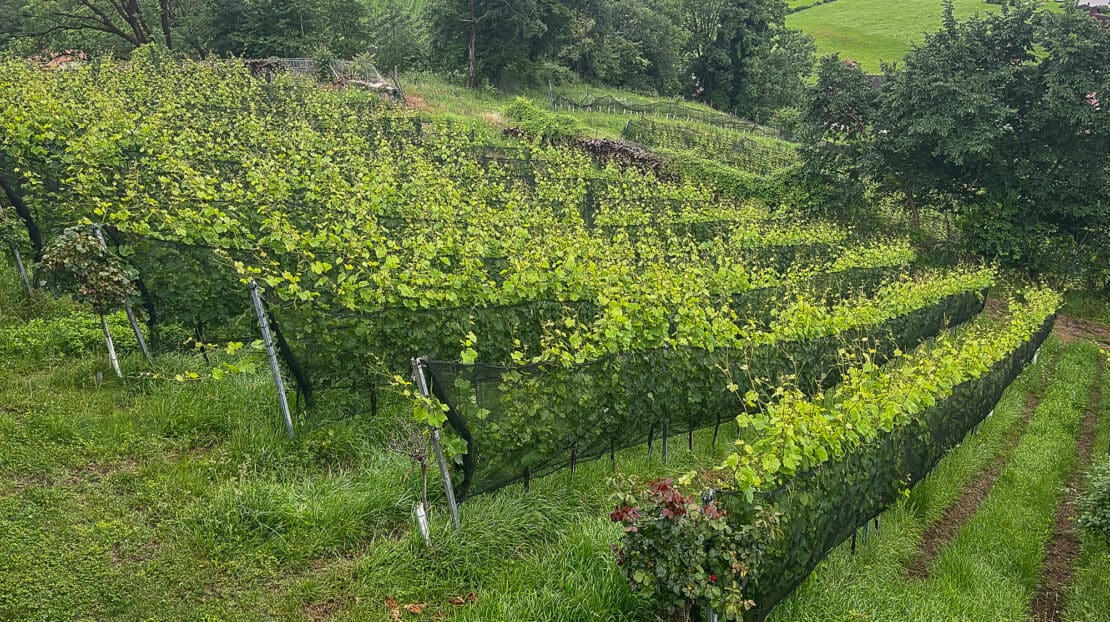
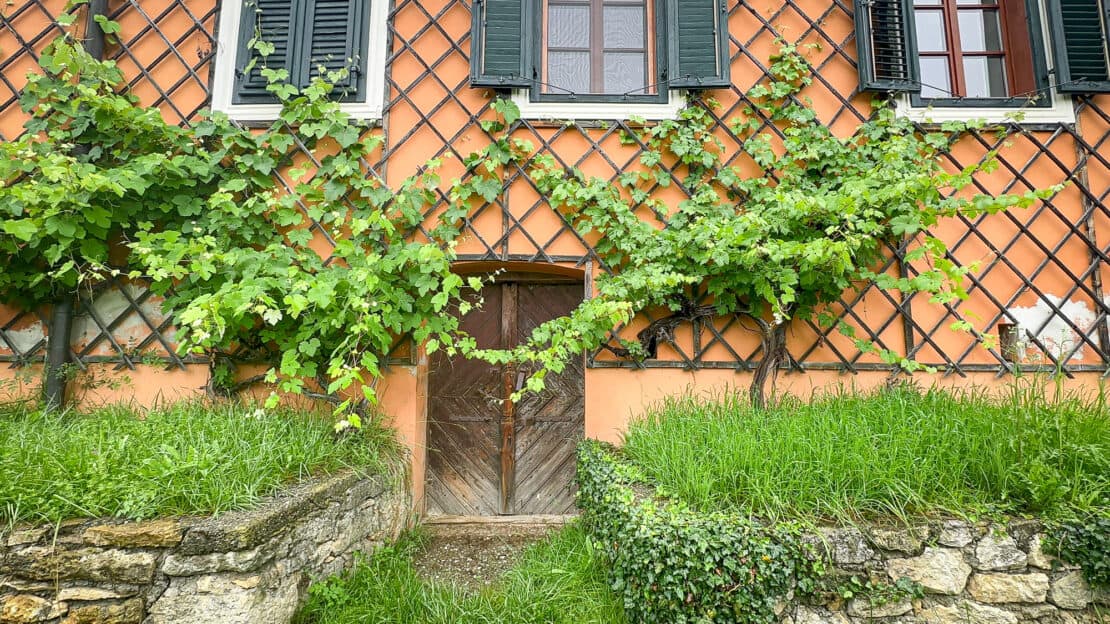
You Had Me at Merlot
Up in the hills but still within the city limits, you’ll find another creative beavering away in the food and beverage arena.
Gabriele Blaschitz is one of the owners of Falter Ego, a name which needs a little translation for English sepakers. Rather than meaning something like a wobbly big headed jerkoff, its name actually relates to the Austrian German for butterfly.
The winemaker, Hannes Sabathi, joins us and talks us through the magical process that transforms water into wine, a process he began learning as a teen.
But, like so many things to do with Graz, even though Falter Ego only started production fairly recently, there’s a mix of old and new.
Historical records found during the renovation of one of the old farmhouses revealed that wine production took place on these slopes at least as far back as 1124.
It’s a beautiful place to walk around and, if you find the right spot, you can see back down to the UNESCO approved Old Town of Graz.
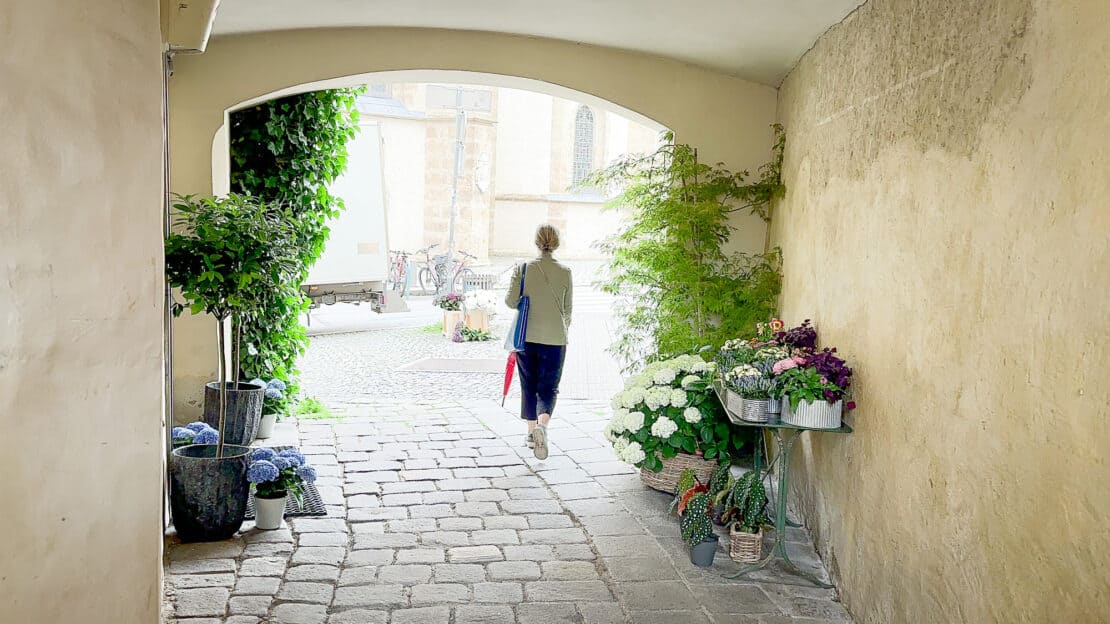
Hidden Parts and Secret Gardens
Back in the Old Town, Helen Petermandl is showing us the secret sides of the city. And, I have to confess, I didn’t think she could. I’ve been travelling to Graz for years and have met some fantastic guides.
I’ve written this article on five different ways to spend one day in Graz and this one on hidden gems in Graz, so I rather arrogantly prepared myself to revist well-trodden ground, a glint of smugness silent in my eye.
It was not to be. Helen showed us secret gardens and hidden passageways but perhaps the most intriguing aspect was the aspects she unlocked which stood in plain view.
In Graz Cathedral, for example, she showed us how to decode medieval numbers. And outside, she deciphered a stone memorial I had walked past many times. With one man shot by arrows, the other eating bread, it is a representation of the plague, a timely yet cryptic reminder of the perils of pestilence. The more recent memorial simply says the letters Covid, albeit in blocks of rust red.
But perhaps best of all, she showed us to one of the oldest coffee houses in Graz. It even shared my name, if you squint at it in German. Cafe König, run by Waltraud Merkl.
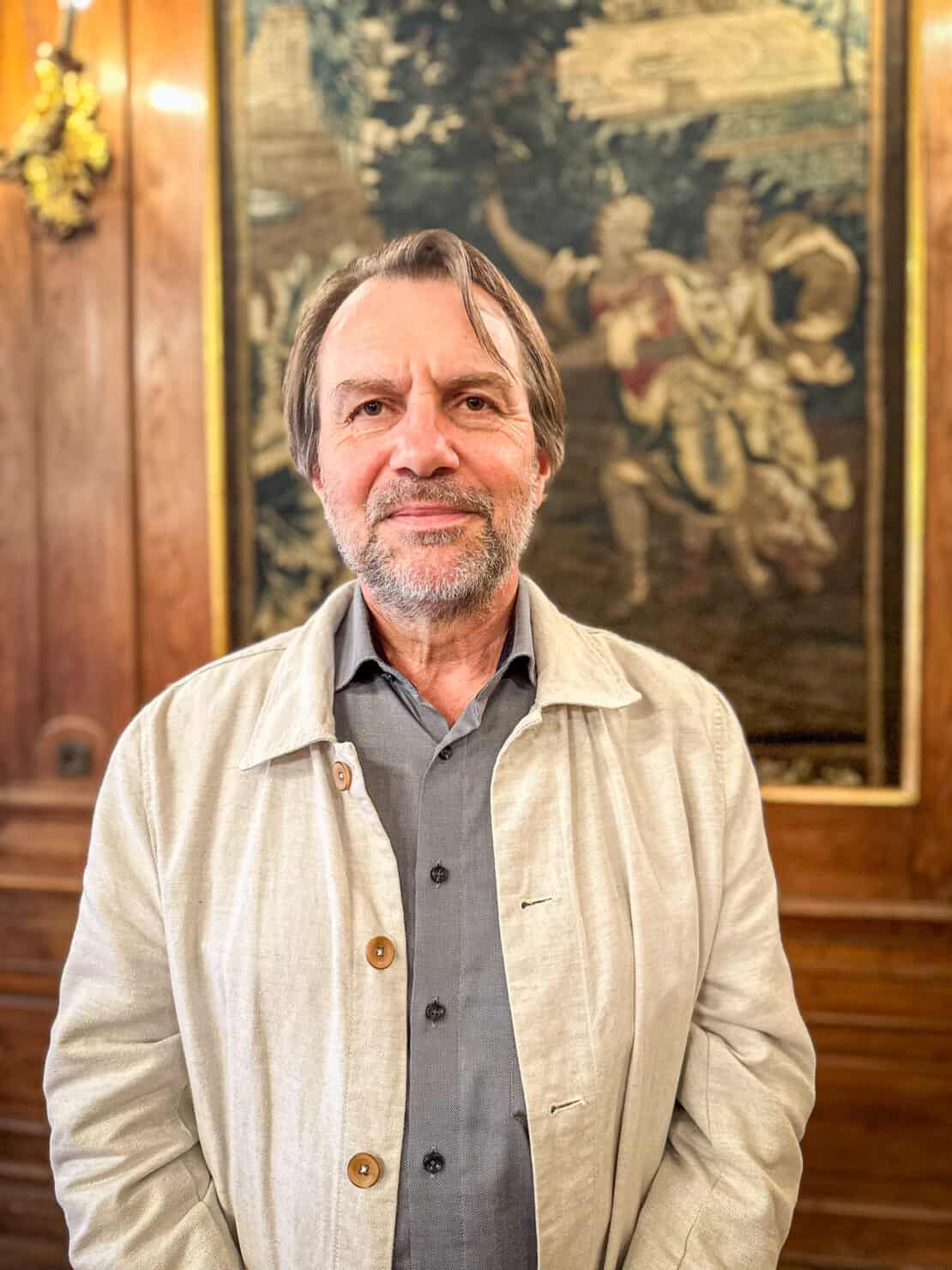
Not Quite the Sound of Music
One other thing almost everyone mentioned was the sense of music in Graz. I’d been at their staggeringly beautiful Long Table event, where you dine on local specialties as the sun sets in the Old Town. So I know the place knows how to run a festival.
But aside from street music, I’ve still not made it to one of the music festivals.
Mathis Huber tried to fill me in. He’s the director of Styriarte, a four week baroque and classical festival founded by Nikolaus Harnoncourt. Each year has a different theme, such as space and sound, and Huber is a man with a lot of ideas.
One of my favourite was the bicycle festival, whereby the audience cycles from venue to venue during an evening to hear the perfectly curated concert.
But he, like Graz, is also quite clear on what he is not.
“You won’t find Mozart concerts for tourists with wigs here,” says Huber. “It is not like in Vienna.”
“We focus on art and we know that music has the power to change the world. As did Alexander the Great.”
With music on my mind, it was time to visit an old friend.
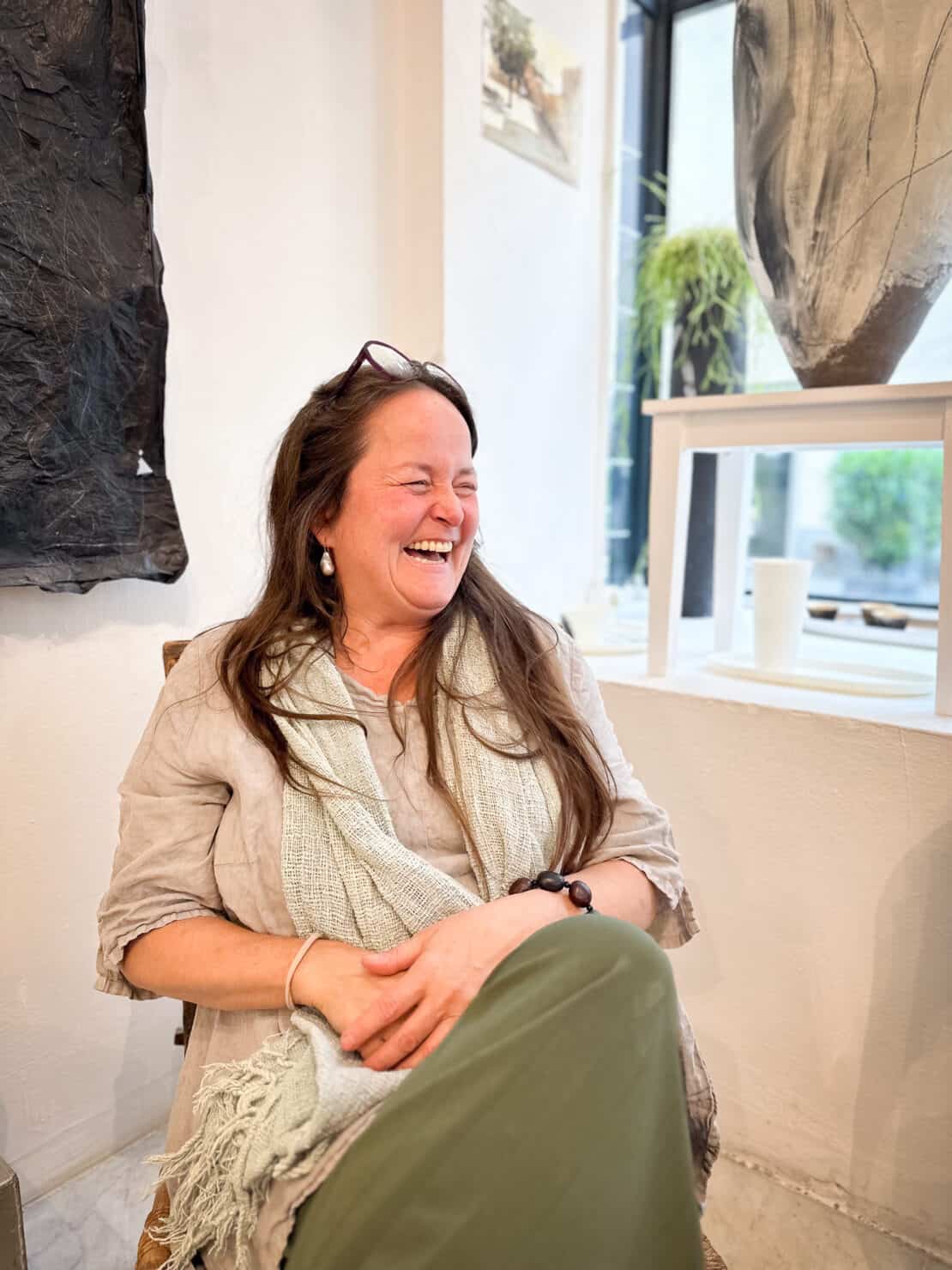
Chinatown
Selma Etareri is an artist who runs Da Loam in the most creative part of an already creative city, not far from the Friendly Alien Kunsthaus.
We first met years ago, during a design focused tour of Lend & Gries and I fell in love with the gentle waves of her creations, with their flecks and hints of gold.
On this visit, she’s rejuvenated. Back from a trip to Nigeria and inspired by the art and creativity she experienced, she’s frustrated with our approach to art in these parts.
” I wonder if we need more struggle,” she muses. “Artists have it so easy, now. We all do.”
In terms of Graz as a city, though, she’s more complimentary.
“Everyone should come to see it,” she says. “It is a city full of creative people, a city of jazz, a city for artists like me.”
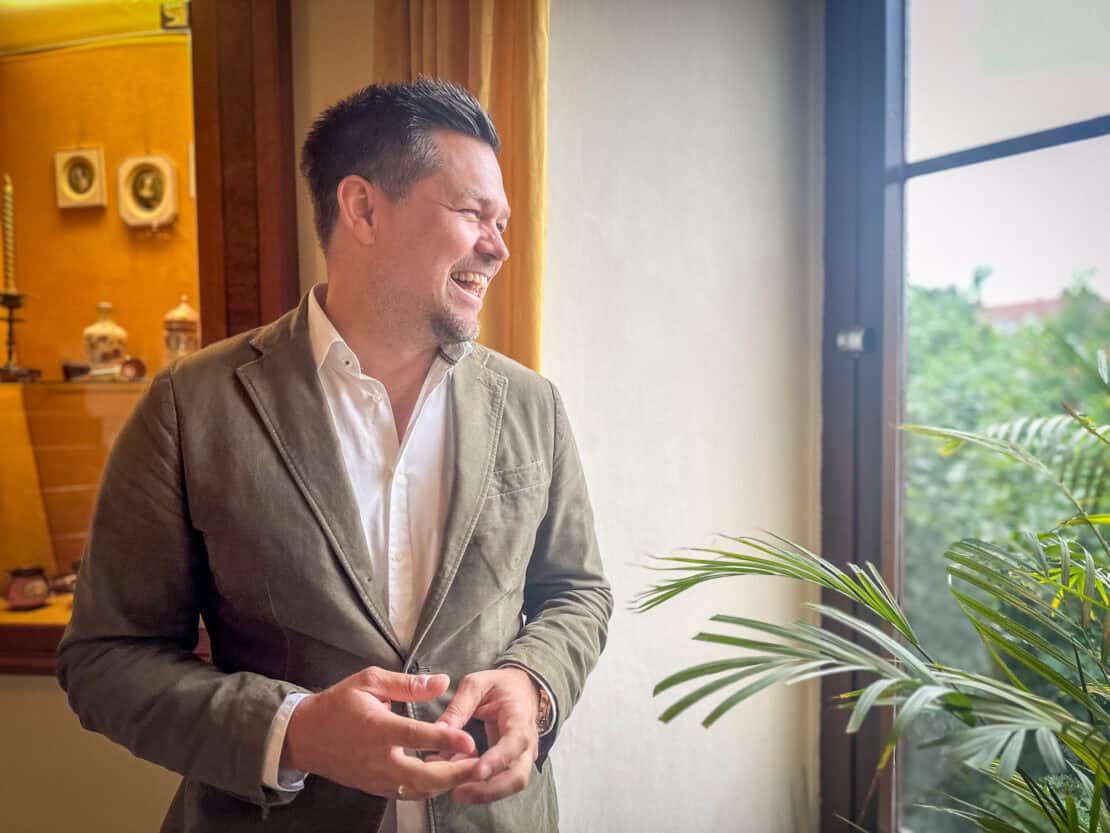
Save the World While You Sleep
So, we’ve travelled through history, taken in art, eaten and drunk well and loaded up on coffee.
What about the aspects of travel we often overlook? Where we sleep and how things get from A to B.
Jonathan Strallegger is a lively, charismatic man. He’s the founder of Velofood, a sustainably minded food delivery service that uses recyclable packaging and bicycle couriers to cut down on carbon emissions.
They are also selective about the restaurants they’ve partnered with. “We try to use restaurants that care. Those that avoid cheap meat and so on.”
Then, there’s the hotel we’re in.
Keep it in the Family
Philip Florian is another charismatic, energetic man (there must be something in the water in Graz.) He talks about his grandparents and his great-grandparents, black and white photos on the wall of this family run hotel.
I’ve often heard people talk warmly about family run businesses but personally, I’ve had reservations. After all, the Murdoch Media Empire is a family run business, as is the Mafia.
But I’m starting to realise that I’m coming at it all wrong.
“The important thing is,” Philip explains,” is that we live here. Our children go to school here. Our parents have retired here. When it comes to making decisions about the hotel, we want to make decisions that are good for the community because we will have to live with them.
“We live in the city and the city lives in us.
“That’s not the case with the big corporations. If the decision-makers live far away, they can just bail out whenever they like. It is easier to become side tracked and think only about profit.
“We also have to face our fellow residents at weddings and parties, so we need to make the hotel a success for them as well. Everyone is welcome here, at the bar and the restaurant.”
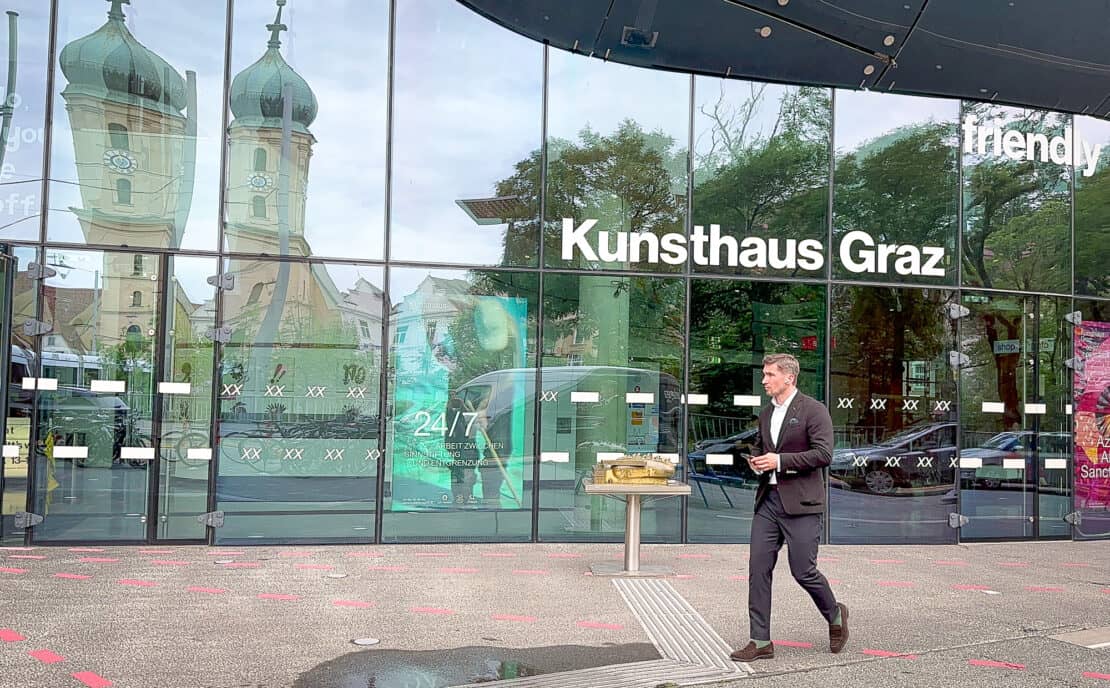
Reflections
And it’s as I’m walking towards one of my favourite restaurants, that I I’m reflecting on my shifting perspectives about family-run businesses.
I spot church spires in the glass of the Kunsthaus Friendly Alien, a reflection that cannot be by accident.
So, is Graz worth visiting?
Every time, I answer yes. Not just for its creativity and new ideas but for the successful way it manages to mix the world of new and old.
And with that, I have to laugh, at least to myself, I realise that’s the truth about family run businesses, heck families full stop. For what else is a family? If not the successful mix of old and new.
With that in mind, here’s my advice as your honorary older sister. Support examples of tourism done well. And go and visit Graz.
Is Graz Worth Visiting? The Traditional Response
So, is Graz worth visiting? Absolutely! And here’s the short answer as to why.
Graz, the second-largest city in Austria, offers a unique blend of historical charm, modern innovation, and cultural richness that makes it a compelling destination in Europe.
In particular, you should visit because of the following:
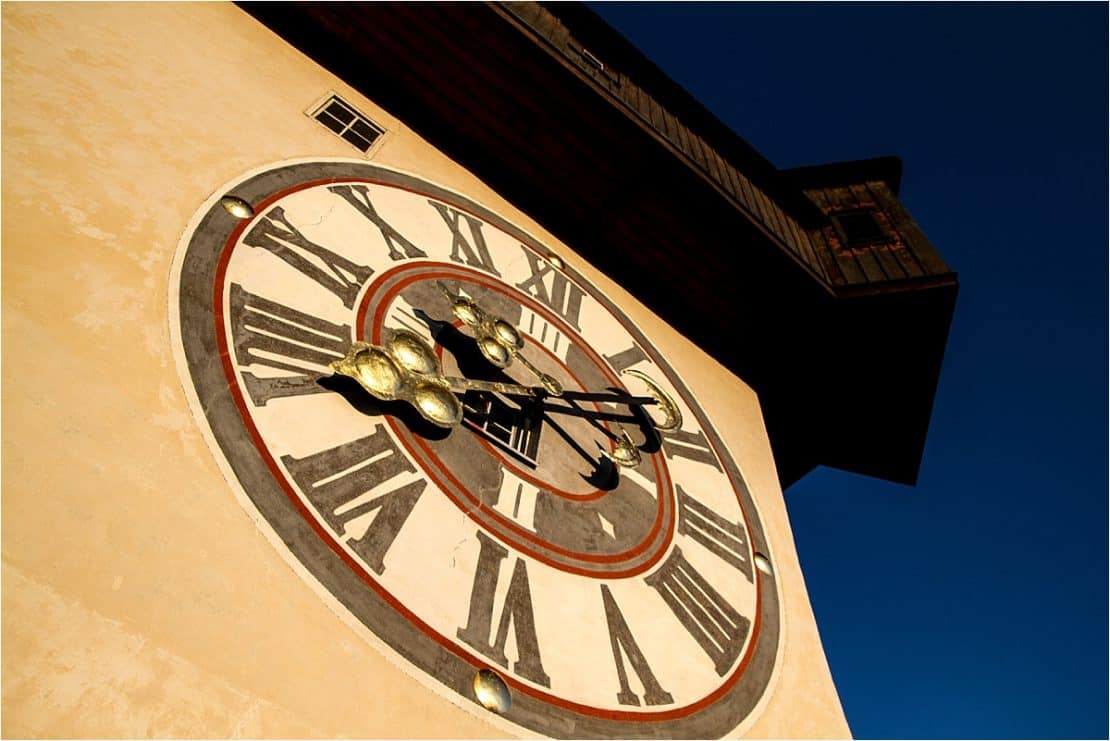
Gorgeous Old Buildings
Graz’s history is palpable as you stroll through its streets. The city’s Old Town, a UNESCO World Heritage site, is a well-preserved maze of narrow, cobblestone alleys, medieval buildings, and Renaissance courtyards.
One of the most iconic landmarks is the Schlossberg, a hill that rises in the centre of the city, crowned by the Uhrturm (Clock Tower). A climb up the Schlossberg offers not just a peek into Graz’s past but also panoramic views of the city and the Mur River.
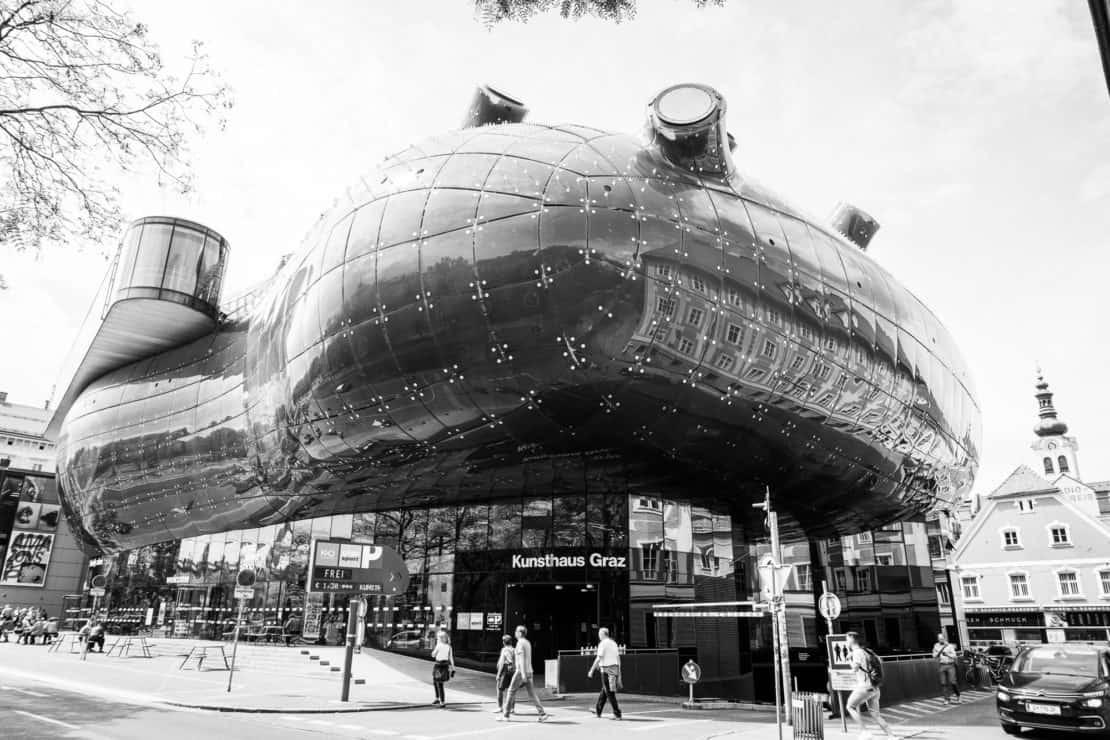
A Hub of Modern Design
Graz is recognised as a UNESCO City of Design, and it shows.
The Kunsthaus Graz, affectionately nicknamed the “Friendly Alien” due to its distinctive, blob-like shape, stands as a testament to the city’s commitment to modern art. It’s an art museum which showcases cutting-edge exhibitions and which reflects the traditional architecture around it.
Another clear example of imaginative design is the Murinsel, an artificial island on the Mur River, designed by American artist Vito Acconci. This floating structure, which resembles a giant sea shell, houses a café, an amphitheater, and a playground and it’s great fun to visit.
Fun Fact: the Murinsel was originally supposed to find a home in New York’s Hudson River. Their loss was Graz’s gain.
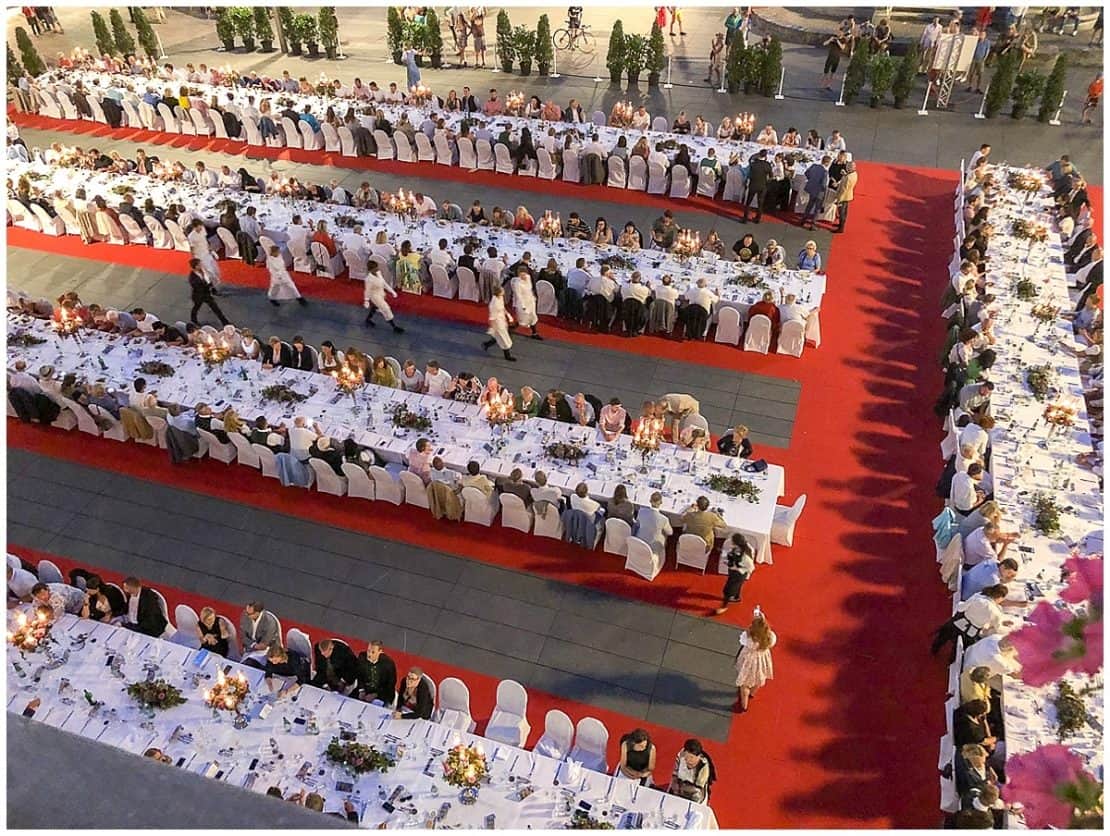
Cultural and Culinary Delights
The city hosts numerous festivals throughout the year, including the Styriarte festival, dedicated to classical music, and the La Strada festival, which brings street performers and theatre artists from around the world.
Then there’s the food. The city is the capital of the Styria region, known as Austria’s “Delikatessenkammer” (delicatessen pantry) and Austria’s official Capital of Culinary Delights.
Local markets like the Kaiser-Josef-Markt offer a bounty of fresh produce, cheeses, and meats and for a once in a lifetime treat, you can attend the Long Table food festival which takes place each year.
Don’t miss trying Styrian specialties like pumpkin seed oil, a unique regional product with a nutty flavour, or the local wines. And if you possibly can, head out into the nearby countryside for Brettljause at a Buschenschank.
Find out more about traditional Austrian food here.
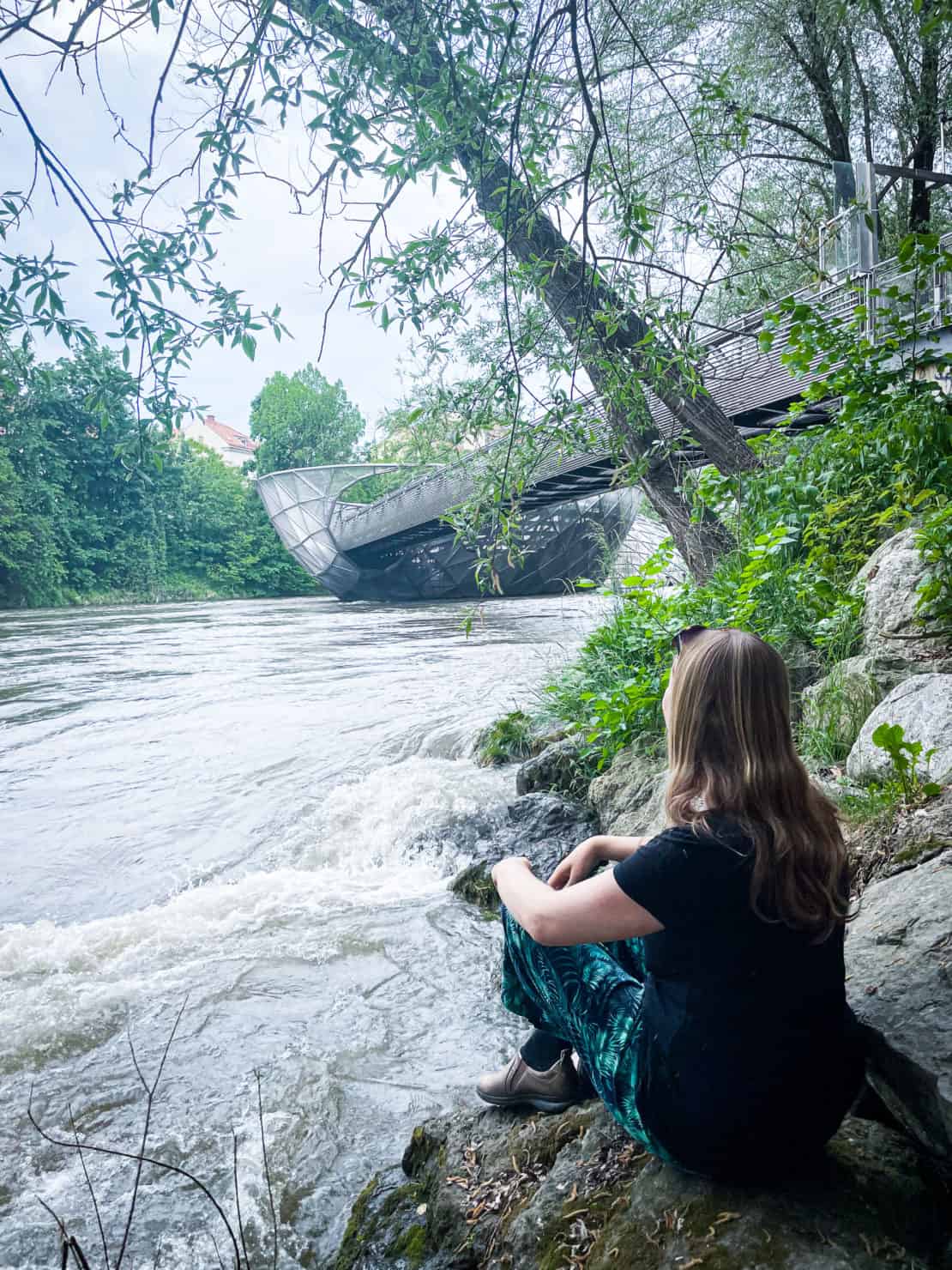
Green Spaces and Outdoor Activities
Despite its urban setting, Graz has plenty of green spaces and opportunities for outdoor activities.
The Stadtpark, located in the heart of the city, is perfect for a leisurely stroll or a picnic. For more active pursuits, head to the nearby Schöckl Mountain, where you can hike, mountain bike, or take a scenic cable car ride to enjoy stunning views over the surrounding countryside.
The city is also bicycle-friendly, with an extensive network of bike paths making it easy to explore its many attractions on two wheels.
So, is Graz Worth Visiting?
Graz is more than just a city; it’s a blend of the old and the new, a place where history meets modernity, and culture thrives in every corner. I love it and have returned time and time again.
Read More About Graz and Travel in Austria
- Why summer in Austria is good for you
- Unique things to do in Graz, Austria’s city of design
- The 10 traditional Austrian dishes everyone should try at least once
- How to enjoy summer in Lech in Austria
- The secrets of the Cheese Road in Austria
- The best places to eat in Graz, Austria’s culinary capital
- Buschenschank Steirmark. Tricky words, great concept
- Dark tourism in Vienna: is it ethical?
- 15 Beautiful lakes in Austria
- Why St Johann in Tirol is Your Secret Tonic this Summer
- The best things to do in Innsbruck (plus an itinerary)

